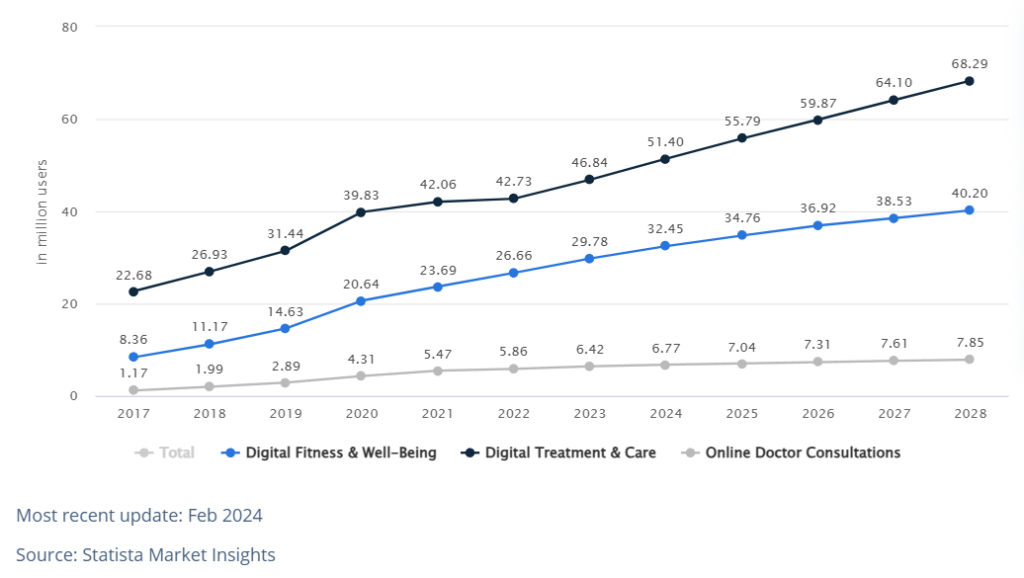In this article, we will examine insights and data from Indonesia healthcare consulting that highlight key dynamics and investment opportunities in the archipelago’s healthcare sector, projecting a revenue of US$2.028 billion by 2024 with a forecasted annual growth rate (CAGR) of 9.53% by 2028.
The Potential of Indonesia Digital Health Market
The Digital Health market in Indonesia is set to achieve significant milestones, projecting a revenue of US$2.028 billion by 2024, propelled by factors like increased internet and smartphone penetration across the nation. The market is expected to continue its ascent with a forecasted annual growth rate of 9.53%, potentially reaching US$2.919 billion by 2028.

Changing Consumer Preferences in Indonesia Healthcare
Digital health solutions are revolutionizing consumer preferences in Indonesia. The convenience and accessibility of digital health solutions are reshaping customer preferences in Indonesia. Busy lifestyles and sporadic access to conventional healthcare services have prompted many Indonesians to turn to online doctor consultations and digital fitness platforms to manage their health and well-being. There is also a noticeable shift towards personalized health management through digital fitness and well-being platforms, which offer tailored workout plans, nutrition tracking, and virtual coaching.

These services are meeting the growing health consciousness among Indonesians, providing an easy way to maintain fitness. Furthermore, the popularity of online doctor consultation services is soaring, particularly in rural areas with limited healthcare facilities, allowing patients to consult with professionals via video calls or chat, thus saving both time and resources.
Indonesia Healthcare: Challenges and Drivers
The government’s initiative towards universal healthcare coverage is a significant catalyst for the growth of the Digital Health market. Efforts to enhance healthcare infrastructure and services nationwide emphasize the use of technology to extend reach and improve access. Moreover, the archipelagic structure of Indonesia complicates the distribution of healthcare services across its numerous islands. This situation makes digital health solutions an essential and practical alternative for many of the country’s residents.
The surge in digital health adoption is further supported by macroeconomic developments in Indonesia such as increasing disposable incomes and urbanization. With more Indonesians relocating to urban centers and undergoing lifestyle transformations, there is an escalating demand for efficient healthcare services. The country’s youthful and technologically adept population also plays a crucial role in driving the market forward, favoring digital approaches to healthcare management.
Strategic Role of Healthcare Business Consulting
In Indonesia digital health market, the segment of Digital Treatment & Care is expected to dominate, with an anticipated revenue of US$906.30m in 2024, underscoring the pivotal role of telemedicine and health monitoring apps in the sector’s growth. As Indonesia continues to embrace these trends, its Digital Health market not only aligns with global movements but also addresses local needs and conditions, paving the way for a more connected and health-conscious future.
For stakeholders and investors, especially those involved in Indonesia healthcare consulting, the evolving trends underscore the sector’s vibrant potential and its capacity for significant advancements. These developments highlight the critical role of informed strategies and technological integration in enhancing healthcare accessibility and outcomes across the region. This perspective is essential as it demonstrates how leveraging digital health innovations can lead to greater efficiency and improved services, ultimately benefiting the entire healthcare ecosystem in Indonesia. By embracing these trends, healthcare professionals and policymakers can facilitate a more responsive and robust healthcare system, better equipped to meet the diverse needs of the population.

